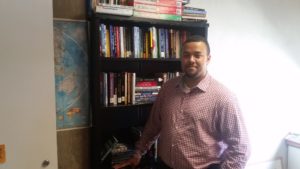Nyron Crawford wants to know who’s responsible for all this disparity
 August 16, 2016
Category: Feature, Featured, Medium, People, Purpose
August 16, 2016
Category: Feature, Featured, Medium, People, Purpose
Nyron Crawford had a lot of questions as a child growing up in Danbury, Conn.
Why was he a ward of the state for most of his life? Who decided when his aunt could legally adopt him? Who was in charge of dictating how long he stayed in a foster home? What were the systems keeping him in poverty?
“How does this happen?” the political science professor asked. “Why does this happen? That can be a very traumatic experience for a child.”
Those questions triggered Crawford’s desire to understand how people are affected by the “intricate, complicated system” that is government and public policy. Now, he does that for a living at Temple University.
The political psychologist and former Massachusetts Institute of Technology fellow has had moments of clarity on his quest to understand government accountability. But every answer, he said, has yielded more questions.
These days, the Brewerytown resident and outdoors enthusiast is researching how people respond to political misconduct. In other words, Crawford is beginning to take a look at how people of color think about government accountability — especially in terms of law enforcement. Right now, he’s exploring correlations between racial anxiety and police trauma.
“There’s an automatic physiological response Black men have in interactions with police,” said the political science wonk. Crawford speaks in depth about his interests with clarity and an alluring hint of curiosity. “I’m trying to understand if there’s an automatic response of stress and what that says about the views Black men have of the legitimacy of police and government.”
Those are physiological consequences of institutional racism, and they undermine the efficiency of the democratic process. It’s a detriment to citizenship — one word Crawford wishes would get thrown around a little more.
“Political behavior is not just voting. Being part of your neighborhood organization, a civic association, volunteering — those are all citizenship activities, not just voting,” Crawford said excitedly. “When people can have a better understanding of their role as a citizen, we get broader participation across the board. Citizenship is understanding how things move together.”
Over the years, Crawford has had his hands in myriad impact pots, including nonprofit management and social enterprise development, working on a sustainable funding tool for nonprofits working to alleviate poverty. In 2006, a stint D.C.-based nonprofit Center for American Progress‘ poverty task force ignited Crawford’s desire to delve back into dynamics of public policy.
Back in Danbury, Crawford “never envisioned” he’d be an academic. But he’s a different kind of academic — one that is willing to use his role to help move the needle forward on economic equality.
Crawford sees himself as an advocate and an “honest broker” — an academic who “interprets data and science and translates it into a way that can be useful for policy makers,” he explained.
Despite his varied interests, Crawford’s highest professional responsibility is to help his students better understand how governments work, both for and against them.
“I want to help facilitate citizenship,” he said. “That’s my big personal teaching goal.”
Trending News









